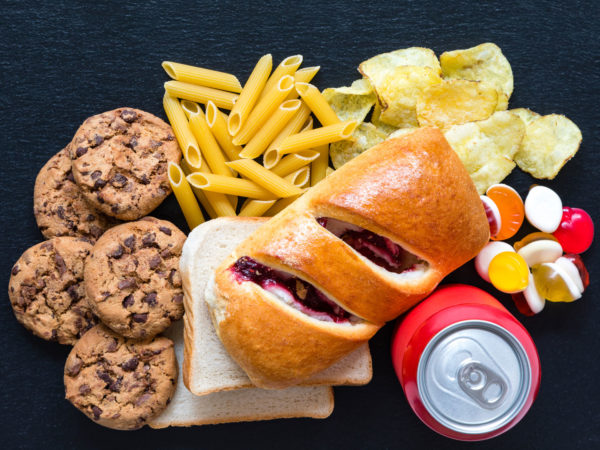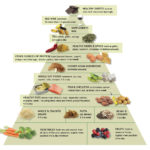Weight Gain On Ultra Processed Foods?
I was shocked to hear about the effect of eating ultra-processed foods for only two weeks. Can they really cause you to gain weight that fast?
Andrew Weil, M.D. | June 18, 2019

Apparently so. A recent study from the National Institutes of Health compared the effects of a diet composed of ultra-processed foods, such as sweetened yogurts, canned foods, processed meats and white bread, to those of a diet of unprocessed foods including oatmeal, fresh fruits and vegetables, sweet potatoes, whole grains and other whole foods. The ultra-processed foods contained a lot of questionable ingredients: hydrogenated oils, high-fructose corn syrup, flavoring agents and various other additives.
For the study, the researchers recruited 20 healthy adult volunteers, 10 men and 10 women, whose average age was 31. All agreed to stay at the NIH Clinical Center for a month and eat the food provided. Both diets included the same number of calories and the same amounts of sugar, fiber, fat, and carbohydrate. Each volunteer followed one of the diets for two weeks and then switched to the other one.
The volunteers were allowed to eat as much as they wanted on either diet, and the researchers reported that while on the ultra-processed foods diet the participants ate more, ate faster and consumed about 500 more calories daily. On average they gained about two pounds as a result (but lost the same amount of weight on the unprocessed diet).
This was the first randomized controlled trial to examine the influence and short-term effects of ultra-processed foods on weight. While earlier studies showed links between diets high in processed foods and health problems, none randomly assigned participants to eat specific foods and evaluate the outcomes. As a result, researchers couldn’t say for sure in those investigations that any poor health or weight problems seen were diet related.
“This is the first study to demonstrate causality – that ultra-processed foods cause people to eat too many calories and gain weight,” said study leader Kevin D. Hall, a senior investigator at the National Institute of Diabetes and Digestive and Kidney Diseases. He added that he was surprised by the “magnitude of the changes we saw.”
A study published in 2016 determined that more than half of the calories consumed in the U.S. come from ultra-processed foods. The researchers defined these as “industrial formulations, which besides salt, sugar, oils and fats, include substances not used in culinary preparations.” Ultra-processed foods frequently contain additives used to imitate the taste and texture of foods prepared from scratch and, in the words of the researchers, “to disguise undesirable qualities of the final product.”
Even so, the continued popularity of ultra-processed foods is not surprising. Cost and convenience are big factors. Dr. Hall noted that food items sourced for the unprocessed diet used in the study cost 40 percent more than the ultra-processed stuff.
Andrew Weil, M.D.
Source:
Kevin D. Hall et al, “Ultra-processed diets cause excess calorie intake and weight gain: A one-month inpatient, randomized controlled trial of ad libitum food intake.” Cell Metabolism. May 16, 2019














